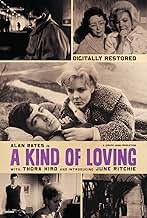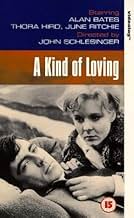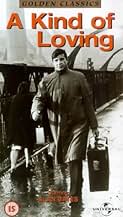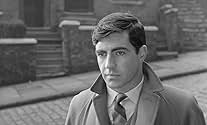CALIFICACIÓN DE IMDb
7.3/10
2.8 k
TU CALIFICACIÓN
Después de casarse con su novia por que ella quedó embarada, un joven debe adaptarse a su nueva vida y lidiar con su suegra.Después de casarse con su novia por que ella quedó embarada, un joven debe adaptarse a su nueva vida y lidiar con su suegra.Después de casarse con su novia por que ella quedó embarada, un joven debe adaptarse a su nueva vida y lidiar con su suegra.
- Nominada a4premios BAFTA
- 1 premio ganado y 4 nominaciones en total
- Dirección
- Guionistas
- Todo el elenco y el equipo
- Producción, taquilla y más en IMDbPro
Argumento
¿Sabías que…?
- TriviaAt the start of this movie, Victor Arthur "Vic" Brown (Sir Alan Bates) and some of his friends are seen perusing a magazine filled with shots of topless models. This is one of the first instances in British cinema showing bared breasts.
- ErroresIn the opening wedding scene, an elderly relative is prevented from taking photographs when the wedding car pulls up in front of her. She is, however, then seen taking pictures on the other side of the car as the bride and groom get in. Then as the car pulls away, she is back in her original position on the 'wrong' side of the car, still unable to take photos.
- Citas
Mrs. Rothwell: How dare you! How dare you say such filthy, disgusting things! You come into this house drunk, filthy drunk! You're filthy! You talk filth, you ARE filth! You're filth! You filthy pig! You filthy, disgusting pig! Filth, FILTH!
- ConexionesFeatured in Eurythmics & Aretha Franklin: Sisters Are Doin' It for Themselves (1985)
- Bandas sonorasDown by the Riverside
(uncredited)
Written by Billy Sherrill and Charlie Rich
Sung at a bar on the pub crawl.
Opinión destacada
Excellent work from all concerned has gone to create what is probably, in spite of its generally melancholy atmosphere, the warmest of the realistic school of British movies from the early 1960s. Vic Brown is not as angry as Arthur Seaton in Saturday Night and Sunday Morning nor as alienated from his family as Billy Fisher in Billy Liar. And he is more likable than either Joe Lampton in Room at the Top or Frank Machin in This Sporting Life. Both Vic and Ingrid are sympathetic, recognisable people, who find themselves trapped in a situation with which their society's stern morality of self-control and self-denial, vividly expressed by Vic's sister towards the end of the film, has no sympathy at all. We finish with them trying to muddle through, and it is this compassionate but still unresolved finale that gives the film its hesitant title.
On the production side, the script, taken from Barstow's novel by those two stalwarts, Waterhouse and Hall, is bang on target; the photography, never less than excellent, is often breathtaking, as in the wonderful long shot of a romantic couple on Southport beach, gradually withdrawing into the confines of a hotel bedroom. But the usually reliable Ron Grainer doesn't quite seem to know where he's going with the music.
The performances are wonderful. The Brown family is lovingly portrayed with the lightest of touches, with particular praise earned by those two veterans, Gwen Nelson and Bert Palmer, as the parents. In the workplace, a fine group of actors, a number of whom were to become household names in the UK in later years, show their true mettle. And leading them all, that magnificent trio of Thora Hird, June Ritchie and Alan Bates.
Of Bates, a fine actor, who left a legacy of performances on film, there's no need to say much: he's perfect for the role, gets under its skin, reveals the longings, the confusions, the contradictions, the lovability, the vulnerability and the folly. No one could ask for more or better.
Thora Hird went on to enjoy a considerable Indian summer of success under the wing of the playwright Alan Bennett, but in spite of some remarkable work during those years, it's at least arguable that she never did anything on screen as intensely realised as Mrs Rothwell. Hird ensures that she is never a figure of fun or a caricature - indeed, she is often very touching in her protectiveness towards her daughter - but at the same time she gives the comic side of the character full value.
June Ritchie is absolutely wonderful as Ingrid. She may never have become the star that, say, Julie Christie (somewhat unwillingly) became, but she was and still is a remarkable actress, worthy of the greatest of respect for her achievement here. In a remarkable way, she fulfils all that was required of a Hitchcock blond: cool on the outside, with fire inside. In fact there's a moment early in the film where she is photographed from Vic's point of view, from behind and slightly above, with a hairdo reminiscent of Kim Novak's in Vertigo. One wonders whether the movie-going that was so evidently part of life in the town spills over into Vic's imagination at this point.
This is the work of a director who seems to have fallen out of favour in recent years, and there is a case to be made that he somehow lost his way. But A Kind of Loving is one of a trio of films, along with Billy Liar and Sunday Bloody Sunday, of which any director could be proud. Of the rest of his output, perhaps only his final collaboration with Alan Bates, An Englishman Abroad, has the same balance of clear observation and compassion.
On the production side, the script, taken from Barstow's novel by those two stalwarts, Waterhouse and Hall, is bang on target; the photography, never less than excellent, is often breathtaking, as in the wonderful long shot of a romantic couple on Southport beach, gradually withdrawing into the confines of a hotel bedroom. But the usually reliable Ron Grainer doesn't quite seem to know where he's going with the music.
The performances are wonderful. The Brown family is lovingly portrayed with the lightest of touches, with particular praise earned by those two veterans, Gwen Nelson and Bert Palmer, as the parents. In the workplace, a fine group of actors, a number of whom were to become household names in the UK in later years, show their true mettle. And leading them all, that magnificent trio of Thora Hird, June Ritchie and Alan Bates.
Of Bates, a fine actor, who left a legacy of performances on film, there's no need to say much: he's perfect for the role, gets under its skin, reveals the longings, the confusions, the contradictions, the lovability, the vulnerability and the folly. No one could ask for more or better.
Thora Hird went on to enjoy a considerable Indian summer of success under the wing of the playwright Alan Bennett, but in spite of some remarkable work during those years, it's at least arguable that she never did anything on screen as intensely realised as Mrs Rothwell. Hird ensures that she is never a figure of fun or a caricature - indeed, she is often very touching in her protectiveness towards her daughter - but at the same time she gives the comic side of the character full value.
June Ritchie is absolutely wonderful as Ingrid. She may never have become the star that, say, Julie Christie (somewhat unwillingly) became, but she was and still is a remarkable actress, worthy of the greatest of respect for her achievement here. In a remarkable way, she fulfils all that was required of a Hitchcock blond: cool on the outside, with fire inside. In fact there's a moment early in the film where she is photographed from Vic's point of view, from behind and slightly above, with a hairdo reminiscent of Kim Novak's in Vertigo. One wonders whether the movie-going that was so evidently part of life in the town spills over into Vic's imagination at this point.
This is the work of a director who seems to have fallen out of favour in recent years, and there is a case to be made that he somehow lost his way. But A Kind of Loving is one of a trio of films, along with Billy Liar and Sunday Bloody Sunday, of which any director could be proud. Of the rest of his output, perhaps only his final collaboration with Alan Bates, An Englishman Abroad, has the same balance of clear observation and compassion.
- gsygsy
- 7 feb 2007
- Enlace permanente
Selecciones populares
Inicia sesión para calificar y agrega a la lista de videos para obtener recomendaciones personalizadas
- How long is A Kind of Loving?Con tecnología de Alexa
Detalles
- Fecha de lanzamiento
- País de origen
- Idiomas
- También se conoce como
- A Kind of Loving
- Locaciones de filmación
- The Promenade, St Anne's on Sea, Fylde, Lancashire, Inglaterra, Reino Unido(honeymoon of Vic and Ingrid)
- Productoras
- Ver más créditos de la compañía en IMDbPro
Taquilla
- Presupuesto
- GBP 165,000 (estimado)
- Total en EE. UU. y Canadá
- USD 6,912
- Fin de semana de estreno en EE. UU. y Canadá
- USD 3,278
- 9 abr 2017
- Total a nivel mundial
- USD 6,912
- Tiempo de ejecución1 hora 53 minutos
- Color
- Relación de aspecto
- 1.66 : 1
Contribuir a esta página
Sugiere una edición o agrega el contenido que falta

Principales brechas de datos
What is the French language plot outline for Algo que parezca amor (1962)?
Responda


















